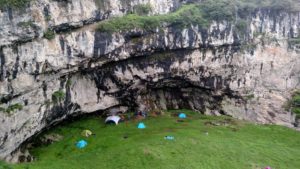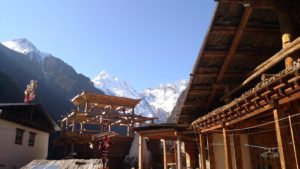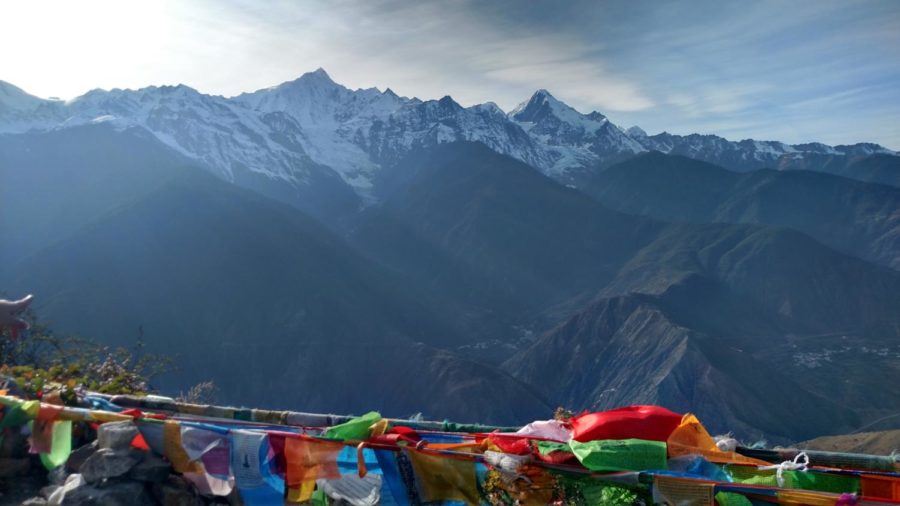Stories Beyond the Summit: Why Multilingualism Matters in the Wilderness
I’m with a group of high school students from the United States somewhere in the mountains of the northeast corner of Yunnan province in southwest China. We’ve set up camp in what appears to be a deep pit with a flat grassy bottom that is, from a distinctly American reference point, about half the size of a football field. A cave overhangs one side of the circular formation where we’ve set up a half dozen tents and are busy barbecuing over an open fire. We’ve hiked out from the small village where we’ve been staying for the past couple of weeks so my students can immerse themselves in Mandarin Chinese and the local life of this rural Miao community. Our guides today are a small group of young men who’ve come up from the nearby city of Zhaotong, which has a population almost twice that of Salt Lake City, though few people outside of China have heard of it.
As the meat cooks over the fire, soft music echoes through the large pit as if it is a concert hall. I recognize a song called “Chengdu,” a gentle, pop-y love song to the city for which it’s named, the capital of a neighboring province. I know the words and sing along. It’s the kind of evening I’ve been fortunate enough to replicate the world over. A beautiful, remote place, a campfire, and songs popular enough that everyone can sing along. This night, though, like many others, I’m at the intersection of where language and culture open up the potential and richness of these experiences, and where they continue to limit me and create new blind spots.
I grew up in Virginia and lived in China off and on for almost a decade, beginning with my junior year of high school. As a result, I speak Mandarin with a high degree of proficiency and can generally navigate China with as much comfortability as I navigate the United States. Coming of age in a second country and pursuing bilingualism has granted me the ability to sit around a campfire and sing songs with guides my age in another language, to build relationships in multiple contexts.
 However, we’re also all urbanites engaged in the deeply urban experience of marching out into an amorphous space confidently called “wilderness” to pitch synthetic tents in the name of recreation. In most meaningful ways, this activity is not so different from the kind of camping I engage in when I’m in the United States, and as much as it might seem otherwise, it emerges from a not-so-dissimilar cultural framework. In the nearby community where we are actually staying for two weeks, these forests are used for firewood and mushrooms and many other things beyond my scope of knowledge. Camping-as-recreation is not part of this cultural world, and in that sense, the guides and I are importing a cultural practice to this space that is grounded in relationships of power and a fundamentally different conception of the outdoors and what it means to engage with it. Mandarin has given me access to relationships and a foundation for understanding in this town, too, though it’s a more distant cultural framework. It would take me far longer to understand and participate in it with the ease of sitting around a fire and singing a pop song with the same chord progressions as the English music of my childhood. How far is this, really, from “Wagon Wheel?” At the same time, how many beautiful nights would I miss in my own country if I didn’t know the words to “Take Me Home, Country Roads”?
However, we’re also all urbanites engaged in the deeply urban experience of marching out into an amorphous space confidently called “wilderness” to pitch synthetic tents in the name of recreation. In most meaningful ways, this activity is not so different from the kind of camping I engage in when I’m in the United States, and as much as it might seem otherwise, it emerges from a not-so-dissimilar cultural framework. In the nearby community where we are actually staying for two weeks, these forests are used for firewood and mushrooms and many other things beyond my scope of knowledge. Camping-as-recreation is not part of this cultural world, and in that sense, the guides and I are importing a cultural practice to this space that is grounded in relationships of power and a fundamentally different conception of the outdoors and what it means to engage with it. Mandarin has given me access to relationships and a foundation for understanding in this town, too, though it’s a more distant cultural framework. It would take me far longer to understand and participate in it with the ease of sitting around a fire and singing a pop song with the same chord progressions as the English music of my childhood. How far is this, really, from “Wagon Wheel?” At the same time, how many beautiful nights would I miss in my own country if I didn’t know the words to “Take Me Home, Country Roads”?
On the other side of Yunnan province in 1991, in an area that was formerly the Kham region of Tibet, a group of Japanese and Chinese mountaineers endeavored to be the first group to summit the 22,000ft mountain known as Kawagarbo in Tibetan and Meili Xue Shan in Mandarin. It is one of the most sacred mountains in the region, a living power, and according to those living in its shadow, it is meant to be respected and not climbed. The mountaineering team set out regardless, though, and when their local guides realized that they intended to attempt the summit, they turned back to warn the village, who began to pray. Just several hundred meters from the summit, the entire mountaineering team was killed in a tremendous series of avalanches in one of the worst mountaineering tragedies on record. In 2001, the Chinese government banned future attempts at the summit and it remains unclimbed. Whether this is understood as an unfortunate consequence of an often-dangerous outdoor activity or the agency of a mountain that is far more than rock and ice is dependent upon fundamental views of human relationships to the earth.
When I approach the world as an outdoors enthusiast, I see the trails I can backpack, the mountains I can climb, and the oceans I can scuba dive. With skills, equipment, and the power and money to access these spaces, I can have incredible and transformative outdoors experiences across the globe. However, this makes it easy to overlook the deeper learning in recognizing that there are complex and multi-faceted histories, memories, and cultural understandings layered on top of each of these spaces. The tragedy on Kawagarbo is an extreme and obvious example of disrespect for local traditions in pursuit of the peak-bagging worship of another cultural world, but every interaction with the outdoors contains multitudes of meaning.
 Learning a second, or third, or fourth language allows intentional and respectful lovers of the outdoors to slowly begin to peel back those layers of meaning to better understand not only what not to do, but what to do instead, and what makes a space meaningful from a different frame of reference. The result will probably be incomplete. It remains so for me in China, where a decade of language study has opened so many doors and made me even more aware of the ones that remain closed. However, this is also true for me in the United States, where rural/urban cultural and political divides and indigenous histories and relationships are often told in languages I do not speak. This shows that I still have much work to do in the two countries that feel like home, let alone countries that are completely unfamiliar.
Learning a second, or third, or fourth language allows intentional and respectful lovers of the outdoors to slowly begin to peel back those layers of meaning to better understand not only what not to do, but what to do instead, and what makes a space meaningful from a different frame of reference. The result will probably be incomplete. It remains so for me in China, where a decade of language study has opened so many doors and made me even more aware of the ones that remain closed. However, this is also true for me in the United States, where rural/urban cultural and political divides and indigenous histories and relationships are often told in languages I do not speak. This shows that I still have much work to do in the two countries that feel like home, let alone countries that are completely unfamiliar.
The place to begin is not the top of the mountain but in the communities that surround it, usually with language, food, and some kind of campfire.



